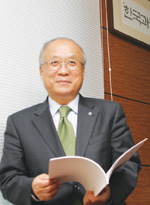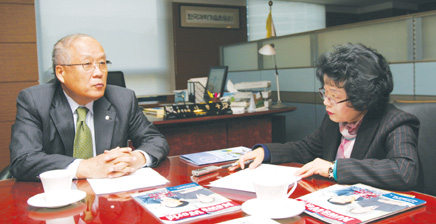KAST¡¯s Bigger Role in Science & Technology in Korea and Abroad


At 15, the Korea Academy of Science and Technology (KAST), the nation¡¯s highest integrated think-tank for science and technology, is striving to expand its horizons in Korea and abroad, KAST President Rhee Hyun-ku said.
On the overseas front, KAST is expected to play a bigger role in contributing to the globalization of science and technology through bilateral and multilateral academic exchanges with foreign academics, as Korea will take the helm at the Association of Academies of Sciences in Asia (AASA), a non-profit international organization of the Asian and Australasian region, Rhee said. ¡°Korea, which spearheaded the establishment of the AASA, will step up efforts to make the AASA one of Asia¡¯s representative academic institutions as Korea will become the member nation at the helm of the organization next year.¡±
The AASA, covering regions from Russia to Middle Eastern and Southeast Asian countries, now has grown into an institution with 27 member academies with science and technology interests from 25 countries. China has joined the AASA, which has its secretariat headquartered in Korea.
Since its inception in 1994, the academy has been actively implementing a variety of programs, particularly in the areas of S&T policy studies and consultations, academic promotion, and international cooperation. KAST has now established cooperative relationships with many globally recognized academies across the world.
In particular, KAST has maintained bilateral academic exchange programs on issues of common interest with the Royal Swedish Academy of Science. Next January, the two will co-organize a joint symposium on neuroscience in which four members of the Karolinska Institute in Stockholm, Sweden, one of the best neuroscience research facilities in Europe, will be invited along with Korean neuroscience authorities, including Dr. Shin Ui-sup. This past January, the two institutions held a joint symposium on new and renewable energy in Sweden.
Ralph J. Cicerone, president of the U.S. National Academy of Sciences and a globally recognized authority in atmospheric chemistry, climate change and energy, will deliver a commemorative speech before the new KAST members at the upcoming 15th Congress of the KAST.
¡°Candlelight vigil demonstrations, touched off by the MBC-TV network¡¯s controversial reports of mad cow disease related to U.S. beef imports prevailed, KAST organized a debate to give a scientific insight into the issue, which drew wide media coverage,¡± KAST President Rhee said. The report of the issue later turned out to be overblown by the broadcasting network, a sharp cry from the results of KAST¡¯s debate, he said.
¡°KAST¡¯s roles are essential as the mad cow case and the ¡®Buan Incident¡¯ related to the construction of a low- and mid-grade nuclear waste storage facility showed,¡± he noted.
The government¡¯s nearly two decade-long effort to build a low- and mid-grade nuclear waste storage facility repeatedly ended in failure, mainly due to the prevailing not-in-my-backyard syndrome, before recently finding a solution ¡ª the construction of a facility near Gyeongju, which is now under way. In particular, the so-called Buan Incident in 2003 apparently provided a bitter lesson as the government¡¯s moves to push a projected nuclear waste site on Anmyeon Island on the West Coast touched off violent, months-long clashes between nearby residents and antinuclear activists against public forces.
KAST held the 61st Roundtable on the theme ¡°Spent Nuclear Fuel Treatment Technology and the direction of Policies¡± at the Seoul Plaza Hotel on Aug. 28. The discussion was designed to discuss the issue from genuinely scientific and technological perspectives with the goal of exploring technological solutions and suggesting the direction of policies. The discussion shaped up as an opportunity for many experts to extend a helping hand in establishing policies on nuclear power.
Treatment of spent nuclear fuel has become the subject of a thorny social issue that needs to be urgently tackled prior to the upcoming negotiation of the revision of the Korea-U.S. Nuclear Cooperation Agreement, which will expire in March 2014, as half-way facilities for keeping high-grade nuclear radwaste are almost running out of space, he said.
¡°There is a high probability if Korea persuades U.S. think tanks to get a better understanding of Korea¡¯s pyroprocessing of spent nuclear fuel, a safer option than North Korea¡¯s plutonium processing for making nuclear weapons, we will build confidence from the United States,¡± he said.
Rhee said, ¡°KAST handles such key social issues as food safety in the agricultural sector and an aging population and neuroscience in the medical field.¡±
In this context, KAST will hold a forum on food security on Nov. 28. ¡°The issue on genetically modified organism foods should have been handled in consideration of food security as the nation faces a stark situation in which all foods, except rice, are only 30 percent self-sufficient in Korea,¡± he said.
KAST has 500 active members, including 66 foreign members, Nobel laureates and equivalents, befitting the conditions of the Korean science and technology circles as foreign academics do on the appointments of their members. At the time of its establishment, KAST had about 900 founding members, including overseas Korean residents, recommended by related academic associations. Active KAST members are entitled to be given inactive membership title at the age of 70, and associate memberships are given to scientists and engineers in their 30s and 40s. The competition rate for becoming associate members is getting higher every year, Rhee said.
KAST presents Yong Scientists Awards in order to identify and honor promising young scientists with outstanding achievements in research and development in the fields of natural sciences and engineering so that they can play leading roles in advancing science and technology in the 21st century, Rhee said. nw
KAST President Rhee Hyun-ku
KAST President Rhee Hyun-kyu holds an interview with NewsWorld President-Publisher Elizabeth M. Oh.
3Fl, 292-47, Shindang 6-dong, Chung-gu, Seoul, Korea 100-456
Tel : 82-2-2235-6114 / Fax : 82-2-2235-0799